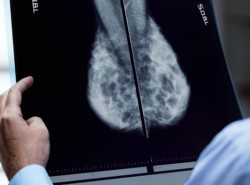
Finding New Causes of Hereditary Breast Cancer
Published: 05/11/22 1:30 PM

Ian Campbell
Project Description: Around 10% of breast cancer is caused by an inherited genetic error (mutation) from a parent. However, mutations in genes such as BRCA1/2 and PALB2 are currently found in less than half of the women diagnosed with hereditary breast cancer. There is evidence that unexplained hereditary breast cancer cases may be caused by yet to be discovered mutations surrounding these known genes. Clinical genetic tests only screen for mutations that are located within the main part or coding part of the gene, (called exons) and mutations can be located outside of these coding regions. These other mutations could result in similarly high levels of cancer risk as the known mutations and could be inherited in families in the same way as conventional mutations. The aim of this project is to identify mutations outside of the coding regions of genes, which are known to be mutated in breast cancer. This will support development of screening tests for those mutations in well-known breast cancer genes.
Why This Work is Needed: Identification of the gene mutations responsible for a hereditary breast cancer leads to a better understanding of the risk that a woman faces. Once the mutation is identified, it allows family members to be screened for this breast cancer marker. The identification of mutations leading to breast cancer is the first step towards personalized medicine and leads to improved breast cancer therapies and better responses. Furthermore, more comprehensive breast cancer risk assessment tools could be enhanced by including the newly identified mutations, located outside of the exon, of the known breast cancer genes.
Expected Outcomes: This study aims to identify new genetic causes of hereditary breast cancer. The results will be used to re-structure clinical genetic tests to identify whether dysregulation of known breast cancer risk genes can be alternatively regulated by mutations outside of coding regions and result in increased risk of the development of breast cancer.
Project Details
The most common genes responsible for familial breast cancer are BRCA1/BRCA2, and PALB2. However, mutations in these genes are found in less than half of the women with familial breast cancer. The failure to identify the exact genetic cause of the breast cancer severely compromises the ability to offer personalized risk reducing options.
Professor Ian Campbell, from the Sir Peter MacCallum Department of Oncology, University of Melbourne, will lead a research team to explore these alternative mechanisms. Using genetic samples from the BEACCON study (6000 from women with breast cancer, and 6000 from healthy controls), the team will be able to analyze parts of a gene located outside of the coding regions (exons) of the gene. If they find that these types of mutations play an important role in risk or development of breast cancer, then standard genetic tests could be quickly adapted to include them.